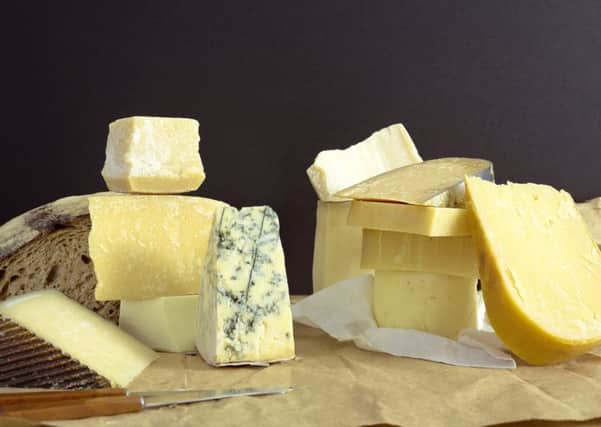Jane Bradley: Cheese faces 9pm advert watershed


Back in the Dark Ages, when the 9pm television watershed actually meant something because everyone watched TV at the same time, it was quite an exciting and mysterious thing.
Generations of 70s, 80s and 90s children wondered about the gratuitous sex, swearing and violence which went on behind this chronological Iron Curtain. As well as the official censors, we had self-appointed watchdogs like the notorious Mary Whitehouse who ensured that programme makers did not overstep the mark and expose our innocent children to outrageous scenes, which made it feel even more deliciously illicit.
Advertisement
Hide AdI wonder what Mrs Whitehouse, who died in 2001, would have thoguht about new rules proposed by the Scottish Government, which would see ads for many types of cheese, pasta sauce, salad dressing and olive oil prohibited from being broadcast before 9pm – along with the usual horror movies and “adult content”. Plans are currently being considered at Holyrood for new regulations which would see adverts for food deemed high in sugar, fat or salt subject to the 9pm watershed, in a bid to prevent junk food from being advertised at a time when children are likely to see them.
The proposals are being considered under a consultation document entitled ‘A Healthier Future - Action and Ambitions on Diet, Activity and Healthy Weight’. Stakeholders are asked to consider a range of measures, including restrictions on price promotions on junk food and encouraging more people to walk and cycle.
Yet the concept of the 9pm advertising watershed is the most intriguing. While the aim is to stamp out the advertising of tantalisingly unhealthy treats to youngsters, the regulations could mean that standard consumables, which – while not necessarily health foods, are part of most normal diets – would also be on the banned list. The government’s blurb in the document describes the idea as a “positive change”, while a spokeswoman insists the proposals are “world leading” and aimed at “improving the food environment”. The strategy has been backed by health organisations such as Obesity Action Scotland, but while it may be seen as a positive change for some, advertisers and TV bosses do not see it in quite the same light. In fact, a report by Ofcom found that broadcasters would lose £211 million in revenue, resulting in adverse consequences for the provision of original UK programming.
In its submission, the Advertising Standards Authority (ASA) said it was “not aware of any new robust evidence” that persuades it to re-examine the idea after a shake-up in regulations less than a year ago. Then, rules changed to ensure that any programmes which are aimed at children or which have an audience made up of a quarter or more under-18s are not allowed to include advertising for unhealthy foods. Yet, there are many family programmes – the likes of Dancing on Ice – which do not count children as a quarter of their audience, but are still watched by a large number of youngsters.
A recent Cancer Research UK study found that young people with high TV exposure were almost twice as likely to consume two or more sugary drinks a week, one or more takeaways a week, and one or more fried potato products a week. Last year, the Commons’ health committee found a pre-9pm ban would reduce the amount of adverts for products high in sugar, fat or salt seen by children by 82 per cent compared to just 37 per cent for the current regulations.
The watershed would ban Mackies ice cream, Irn Bru and Tunnocks teacakes in their current guises – things could change if they dramatically reduced the sugar content of their recipes – as well as hundreds of other multinational snack food brands. Olive oil, often lauded for keeping the hearts of Mediterraneans in good health, would also be on the banned list, along with fresh fruit juices, considered too high in sugar. The Dolmio commercials, which conjure up images of an idyllic Italian family gathering around a rustic outdoor table to eat their salt-laden pasta dinner, would be likely to be taken off air until 9pm. Perhaps in this case, quite rightly, as Mars Foods, the company which owns the Dolmio brand, admitted in 2016 that its foods should only be eaten once a week due to the high salt and sugar content. It has, however, since then, begun to lower the amount of sugar and salt in its foods. All of these products would fall under the “High Fat Salt or Sugar” category, despite not being usually classed as junk food. Ironically, there is no such restriction on ads for booze. While there are regulations around how alcohol can be advertised – it should only feature models who appear to be over 25 and should not reflect the culture of people under 18 – there is no actual watershed on booze commercials and in fact, the ASA tells me that it has very few complaints about alcohol advertising.
Advertisement
Hide AdThere are other complications. Under current devolution arrangements, the government would have to come to an agreement with Westminster for a UK-wide watershed to be introduced, but they say that if the idea was not welcomed by Westminster, Holyrood would request powers to devolve the issue to the Scottish Parliament. Labour has already said it would back a UK-wide ban.
There’s no doubt action needs to be taken to tackle Scotland’s obesity crisis. We are failing our children over issues such as poor quality school meals, among many, many others. Yet, I am not sure about this one. Reducing the glorification of junk food can only be a good thing, but there must be a way of doing it without banning foods which can be part of a normal healthy diet. More specific legislation is needed.
